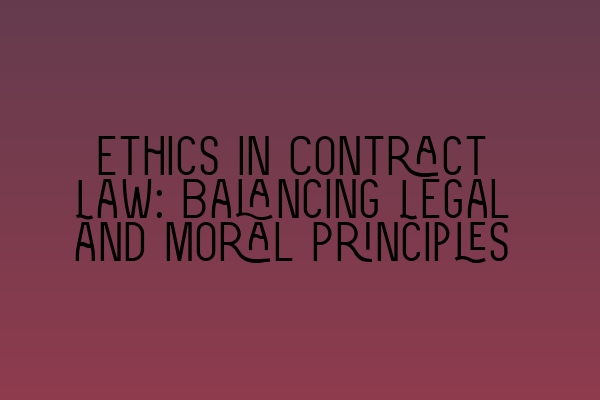Ethics in Contract Law: Balancing Legal and Moral Principles
Contract law is the foundation of business transactions, providing a framework for parties to establish legally binding agreements. While contract law strictly governs the rights and obligations of parties, it is essential to recognize the role of ethics in shaping the practice of contract law.
At SQE Contract Law, we believe that maintaining a balance between legal principles and moral values is crucial in achieving fair and just outcomes. In this article, we will explore the importance of ethics in contract law and how it influences the decision-making process. We will delve into key ethical considerations, such as fairness, honesty, and good faith, and discuss their implications in contract negotiations and enforcement.
The Role of Ethics in Contract Law
Contract law is inherently driven by legal principles governing offer, acceptance, consideration, and the intention to create legal relations. However, the application of these principles requires ethical considerations to ensure fairness and reasonable expectations between parties.
One of the fundamental ethical principles in contract law is fairness. Contracts should be equitable, with both parties achieving a satisfactory outcome. Fairness entails treating all parties involved in a contract with equal consideration and preventing the exploitation of a weaker party.
Moreover, honesty plays a significant role in contract law ethics. Parties must provide accurate and complete information during the negotiation process. Failing to disclose relevant facts or providing false representations can undermine the validity and enforceability of a contract.
The Principle of Good Faith
The principle of good faith is a vital ethical consideration in contract law. It requires parties to act honestly and fairly throughout the entire contractual relationship. Good faith imposes a duty of loyalty and a commitment to cooperate in resolving unforeseen issues that may arise during contract performance.
In some cases, the principle of good faith may require parties to disclose information that is not explicitly required by law. For example, a seller may have an ethical obligation to inform a buyer about potential defects in a product, even if not mandated by contract law. This promotes trust, transparency, and enhances the overall integrity of the contractual relationship.
Ensuring Ethical Conduct in Contract Negotiations
During contract negotiations, parties must strive to maintain ethical conduct to foster a fair and productive environment. Negotiations should focus on creating mutually beneficial agreements, rather than exploiting the vulnerabilities of the other party.
Effective communication is key in promoting ethical behavior during negotiations. Clear and transparent communication ensures that both parties fully understand the terms and conditions of the contract, reducing the risk of misunderstandings or intentional manipulation.
Additionally, seeking legal advice from a solicitor can help parties navigate the complexities of contract law while adhering to ethical principles. A solicitor acts as a guide, ensuring that negotiations are conducted in good faith, and all legal and ethical considerations are taken into account.
Mentorship for Aspiring Solicitors: Nurturing Talent in the Legal Field
Exploring Alternative Dispute Resolution: An Effective Approach to Legal Conflicts
Navigating the Legal Practice Course (LPC): Your Path to Solicitor Qualification
Mastering Client Care Skills: Essential for Solicitors
Legal Challenges and Pitfalls: Strategies for Navigating Complexities
Enforcing Contracts Ethically
Once a contract is established, parties have an ethical obligation to fulfill their agreed-upon obligations. Honoring the terms of the contract helps maintain trust and confidence in business relationships.
In the event of a breach of contract, ethical considerations should guide parties in resolving the dispute. Exploring alternative dispute resolution methods, such as mediation or arbitration, can help reach a mutually acceptable solution while minimizing the impact on the parties’ relationship.
Seeking legal advice from a solicitor skilled in contract law can also contribute to ethical enforcement. A solicitor can provide guidance on the applicable legal remedies and assist in negotiating an equitable resolution.
Conclusion
Ethics in contract law plays a pivotal role in balancing legal principles with moral values. Upholding fairness, honesty, and good faith throughout the contractual process ensures that parties can trust and rely on the agreements they enter into.
At SQE Contract Law, we recognize the importance of ethics in contract law and strive to uphold the highest ethical standards in our practice. By integrating legal and moral principles, we aim to provide our clients with effective and ethical solutions to their contractual needs.
